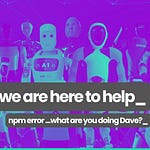While Jamie’s away enlightening people about AI & Automation, I've gone a bit further into the possible economy of the future.
And you don't have to go far in that area before you come across Universal Basic Income (UBI). We've talked briefly about it in other episodes and I’ve talked about it in principle on other blogs but this time we're diving deep with Alex Howlett from the Greshm Institute in Boston, who's going to flip everything you thought you knew about AI and automation on its head.
Even if a UBI turns out to not be the solution (I really don’t see it as a silver bullet), it is the fastest way I've found of getting people to think about whether AI & Automation should work for us or whether we should work for it.
An instead of dreading the robot takeover, Alex suggests maybe we should worry about why it's not happening faster!
Consider the UBI proposal, but not as a life raft in a sea of tech unemployment. Instead as a catapult into a future where money is both earned and also automatically spread around the economy in a calibrated mix to reduce socially useless work.
Here's a breakdown of our chat if you'd like to jump ahead:
Chapter 1: The Automation Paradox [00:00:00 - 00:01:00]
Alex discusses the paradox of technological unemployment, arguing that economic policies that prioritize job creation are actually hindering the full potential of labor-saving technologies like AI.
Chapter 2: Rethinking Universal Basic Income [00:01:00 - 00:03:00]
Dave and Alex explore the unconventional angle of Universal Basic Income as a tool not just for combating job loss due to automation, but to liberate us from unnecessary work altogether.
Chapter 3: The Cultural and Economic Shift [00:03:00 - 00:10:00]
The discussion pivots to the cultural resistance and economic implications of reducing work hours. They also address how UBI could reshape societal views on work and productivity.
Chapter 4: Global Impact and Macro Economics [00:10:00 - 00:20:00]
Alex gives a macroeconomic perspective on how a UBI could affect the global economy, discussing potential shifts in labor supply, demand, and the international repercussions of such a policy.
Chapter 5: Practical Implications and Future Visions [00:20:00 - 00:30:00]
The conversation gets into the nitty-gritty of how UBI might be implemented practically, the gradual adjustment to the economy, and the potential for an increase in creative and innovative job engagement.
Chapter 6: Debating UBI's Necessity and Inevitability [00:30:00 - 00:40:00]
They debate whether UBI and the automation of jobs are inevitable or if these are just theoretical solutions in response to current and future technological advancements.
Chapter 7: Concluding Thoughts and Further Discussion [00:40:00 - End]
Wrapping up, Alex & I discuss the broader philosophical and cultural shifts that might come with widespread adoption of UBI.
Want to explore more?
You can find Alex at https://twitter.com/AlexHowlettUBI
https://www.greshm.org













Share this post